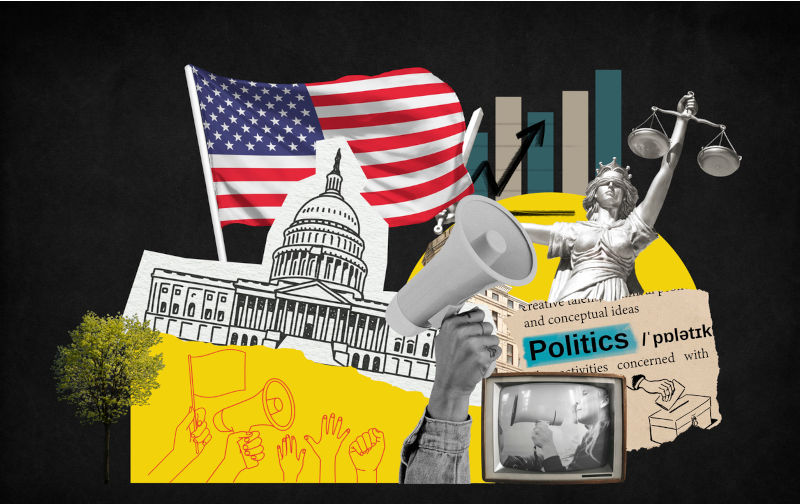Standing in the tiny foyer of a small theatre that had seen better days on a residential street in inner-city Philadelphia, I asked a fellow theatre-goer standing next to me, “Are you looking forward to some comic relief?”
“You bet,” the man said.
He and his companion, both apparently of retirement age, had come all the way from the suburbs to see This Is the Week That Is: An Election Special, a sketch comedy written, produced and performed by the local Philadelphia theatre company 1812 Productions and comprising a series of partly improvised parodies revolving around the November 5 presidential election.
“Would there be many Trump voters in this crowd?” I asked, noticing that the foyer was rapidly filling up.
“No way,” the woman laughed. Then the man chimed in. “They won’t get any joy from this. Too much fact-checking. They don’t like fact-checking!”
He then added, “You know, when Walz was fact-checked about whether he was at Tiananmen, he just said he had made an error. When Vance was fact-checked, he just lied more.”
Philly is usually a blue city, but the woman I was talking to has noticed that about one out of ten yard-signs displayed in front of people’s houses on her street proclaimed their support for Trump.
Jennifer Childs is the founder of 1812 Productions, and co-creator and head writer of this production. She and the show’s director, Melanie Cotton, both acknowledge that election cycles can be “anxiety-producing,” and that audiences coming into the theatre would be worried about the election. Childs said she wanted her show to be therapeutic: having done plenty of comedies that are escapist—just come and don’t think about anything and laugh at something stupid for two hours.
It was obvious they achieved their goal. Everyone, including the couple who had talked to me earlier, walked out with smiles, their facial muscles visibly more open and relaxed than when they went in.
According to a poll from as early as May this year conducted by the American Psychiatric Association, 73 per cent of Americans said the election was already causing them anxiety. It is unsurprising, then, that anxiety levels only seem to be intensifying as the election draws closer.
One Philly resident said she believed that the anxiety recorded in May might have “evolved into a more complex combination of emotions including fear, hopelessness, uncertainty feeling frozen and worrying about what’s to come.” Kathryn, with a background in education, seemed hard pressed to decide which would be the more scary scenario: Trump winning, with his emboldened supporters possibly unleashing their violent energy on their opponents (not to mention what might happen to immigrants and women); or Trump losing, potentially leading to widespread violence from angry supporters believing, once again, that the election had been “stolen” from their candidate.
“There is this fear that whoever is elected, there is no winning,” Kathryn said.
Hotlines have been set up to help people in Philly suffering from election anxiety and depression. Psychologists are advising people to limit their media exposure to no more than half an hour a day, to practise deep breathing, and to become engaged in campaigning. Many people resort to making agreements with families, friends and colleagues not to talk about politics, and some workplaces are offering training on how to handle political disagreements among employees.
While voter anxiety is across the board for both Trump and Harris voters, one survey suggests that Democrat voters report a higher level of stress, albeit for different reasons.
Spending just one evening talking to people at This Is the Week That Is made me realise that if I want to meet a big crowd of politically motivated people in Philadelphia on a weekend, my surest – and perhaps safest – bet might be to find another comedy in town about the forthcoming election.
So, the next afternoon I went to see another political satire, in the hope of finding out why Democrat voters are anxious despite the fact that Philly is a relatively safe blue city.
As it turned out, the Arden Theatre in downtown Philadelphia has also been doing its bit to relieve voters from election anxiety, by staging a Broadway hit called POTUS: Or Behind Every Dumbass Are Seven Women Trying to Keep Him Alive. The show is described by the Washington Post as “located somewhere on the satirical dial between 9 to 5 and Veep.” With the election just under one month away, the timing of the show assumed increasingly urgent poignancy. Due to popular demand, it has been extended for another week in Philadelphia.
Director Jennifer Childs, also one of the stars and writers of the 1812 production discussed earlier, is acutely aware of the timing of the show:
POTUS will close before our presidential election in November. I have no idea what the outcome of that election will be. … My hope is that … [after the election] this beautiful and funny play will be irrelevant.
But will it? Will it indeed become irrelevant?
During the intermission, I asked Roxanne and Trish, the two women sitting next to me, if it was safe to assume that most of the audience were Democrat supporters. “Oh yes, I think so. With a cast of seven strong women, with a strong feminist undertone, Trump supporters just wouldn’t find it funny.”
But the laughing and camaraderie shared by the audience belied a pervasive, palpable anxiety. “You can feel the tension in the air. And that’s because Trump is so unpredictable.”
Another common refrain I’ve been hearing with increasingly frequency over the last few weeks here is, “You just don’t know what’s going to happen.”
Roxanne is a regular theatre goer who decided to home-school her four children partly due to her concern about guns in the schools. After getting a teaching degree, she now teaches English to new migrants and refugees. For her, the uncertainty of not knowing what’s in the next news cycle is very anxiety-making.
Roxanne’s theatre-going buddy Trish is an African American woman who also home-schooled her children. Trish was disgusted with Trump’s – and his supporters’ – comments questioning Kamala Harris’ blackness.
She said she is now more worried after the Walz vs Vance debate:
Neither Trump nor Vance has ever admitted that the 2020 election was legitimately won. So, if Harris wins, Trump is not likely going to accept it peacefully. So, we may have riots or violence. If he wins, I don’t know what’s going to happen, especially with black women in this country. One way or another, it’s going to be difficult to predict.
Uncertainty aside, the other anxiety-inducing factor is the neck-and-neck closeness of many of the polls. Trish continued:
We’re told constantly that the margin between the two parties is now widening, and then it’s closing again. Or it’s getting closer in one state, or widening in another. It’s nerve-wracking.
Roxanne attributed her anxiety to the fact that anything can derail your preferred party’s chances.
First, it’s the disastrous performance from Biden. Then the Middle East. Then the assassination attempt. Then Harris stepped up. That was a relief, but we knew so little about her. Then the hurricane. And Trump never stops lying. You never know what’s around the corner. You’re always on edge.
In a way, Roxanne echoed what Kathryn said to me earlier about the broken trust, which seems to go to the heart of what is causing this widespread anxiety, at least on the part of Democrat voters:
Can you trust someone who likes to tell lies, distort history, tries to invalidate an electoral system that we rely on, and that other countries look to us as a symbol of democracy?
Kathryn’s question was meant to be rhetorical. But for many Americans the answer could still turn out to be a resounding – and alarming – “Yes.”
Wanning Sun is a professor of media and cultural studies at the University of Technology, Sydney. She also serves as the deputy director of the UTS Australia-China Relations Institute. She is a fellow of the Australian Academy of the Humanities and a member of the Australian Research Council’s College of Experts (2020-23). She is best known in the field of China studies for her ethnography of rural-to-urban migration and social inequality in contemporary China. She writes about Chinese diaspora, diasporic Chinese media, and Australia-China relations.

